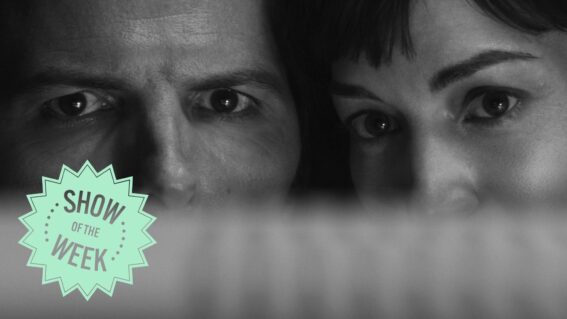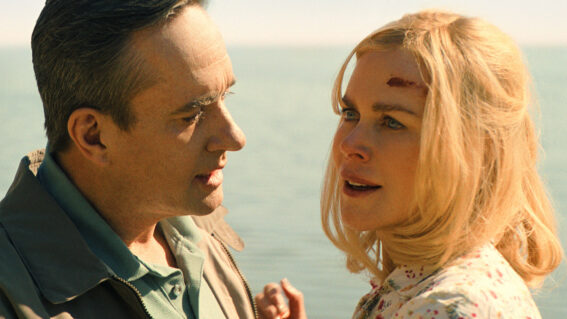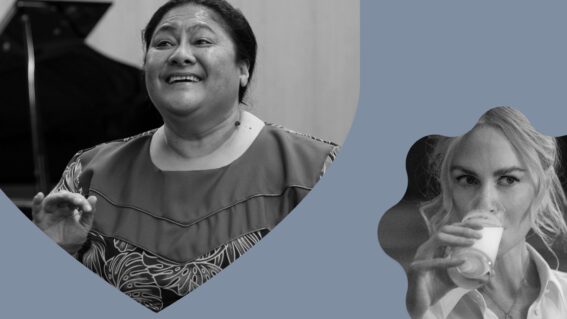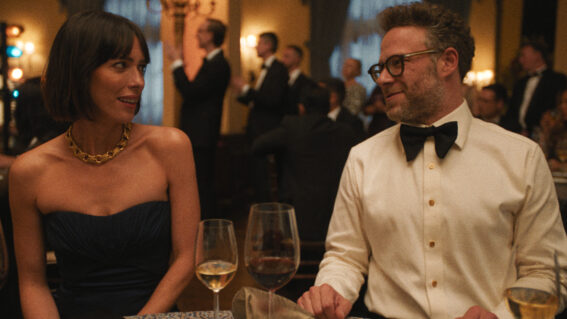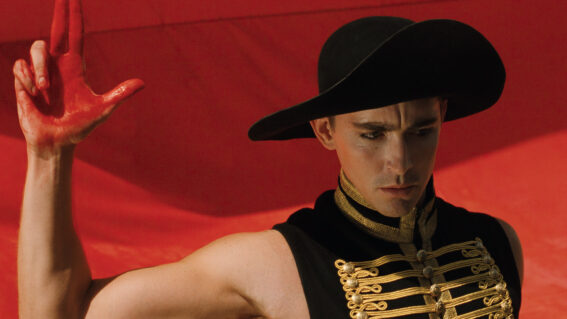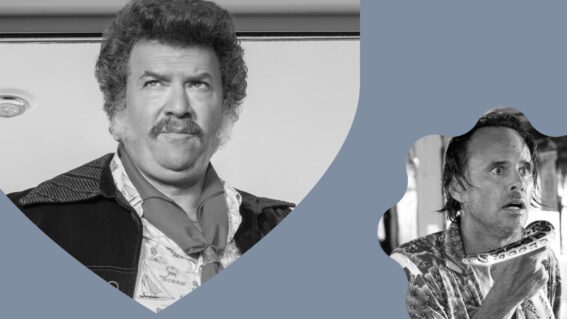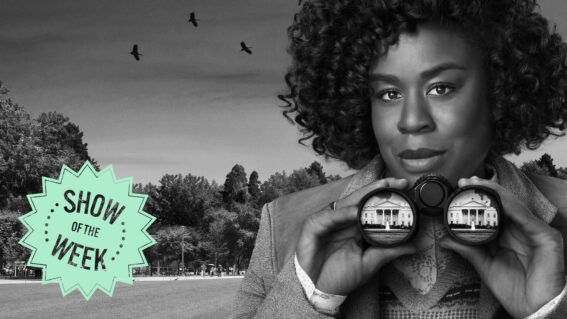Interview: Andrew Adamson, director of ‘Mr. Pip’
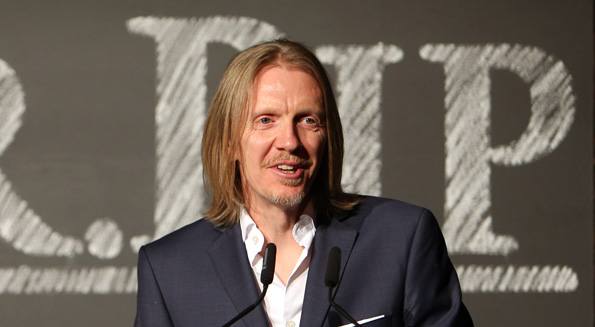
Andrew Adamson’s long-awaited adaptation of Lloyd Jones’ acclaimed novel Mr. Pip is now in cinemas. Hugh Laurie stars as the eccentric Mr Watts, sole remaining European inhabitant of a Papua New Guinean village on the fringes of Bougainville’s civil war. With teachers having abandoned the village, Mr Watts cleans up the classroom and begins sharing the classic novel Great Expectations with eager students. One of them, Matilda, finds her imagination transported to the Victorian world as tragic drama unfolds. We spoke to director Andrew Adamson about his film ahead of its recent World Premiere.
How long has the process taken since you first started the adaptation?
I read the book when I was finishing Prince Caspian, so effectively six or seven years ago. Not that I was working on it continuously through that time, but from acquiring the rights, having the first conversations with Lloyd Jones, getting the script up – which was a challenge, adapting is very challenging – through all the logistics and then the editorial process, it has been very elongated. Partly because I didn’t have a release date. Normally you stop because you have to. Without having that hanging over your head, you can keep noodling forever until finally you just have to say, “OK. I’m not making it any better at this point; I’m just making it different.”
What’s it been like adapting a living author’s work and having Lloyd participate in the process?
It’s interesting. It’s really good actually, you can go any way and it’s always hesitant. You want to go into it knowing you do ultimately have control – you don’t want to get into a dispute – but that being said, it was never even an issue. Lloyd was very supportive. He said right at the beginning – once we’d built that trust – he just said, “Look it’s your movie. It might be my book, but it’s your movie.”
There were times throughout when I would call him and say “Look I’m having trouble with this. You tell me what you were intending, because I’m trying to do this.” There was a point particularly in Lloyd’s book where, after Matilda goes back to Australia, she becomes a Dickensian scholar. When I got to the point of writing this, I kept trying to write it, and I finally called him. I said, “I know your Matilda picked up the book again, but mine can’t. Inside the character, I don’t feel like she can pick up the book until she’s healed. This book did so much damage to her – and yes, ultimately indeed it’s her redemption – but it hurt her so much.” He was just like, “Yeah, you know, I can see how you would feel that way. I didn’t but I can completely see why and you should go with that instinct.”
I can picture that being a very interesting conversation for both of you.
It was. He was very generous, giving and understanding. I guess because he’s a writer, he understands the writing process and realised that mine would be slightly different from his.
With one of the main themes of the novel being how you imagine characters while reading, you actually had to put them on the screen. Was that mind-boggling?
Once I kind of embraced this idea of putting yourself in a novel, it was actually fun. It’s an idea that’s mentioned in the book and it’s something I’ve experienced myself – you bring your own experience and expectations to it. Once I realised that and embraced that, it then became how to explore that.
It was my wife Nikki, who is an artist, who put me on to a number of artists who were dealing with colonialism though costume and different types of artwork. That became apparent that it was an obvious way to go for Matilda – to bring her colours and her textures and so on into the world. And the world expands as her knowledge of the book expands.
The first scene is quite small and natural. Then there’s a beach that’s unlike their beach. Then it goes on to the forge and other scenes. The world actually builds until we’re in the town with the Great Expectations street at the end. But it always brings in elements of her world: palm trees, colours, ducks on the street, or whatever it is. More than daunting; I think that was one of the fun aspects of it.

When it came time to have you own specific take on Great Expectations, how did you make those key decisions about particular performances and diction?
The diction was an issue because within the book, Lloyd talks about the fact that Mr. Watts did the voices and so I was aware of the fact that they would be hearing an Anglicised version of Great Expectations. It didn’t feel right when everyone was speaking with Bougainvillian accents but saying this ye olde English text. It didn’t fit. So that change, again, was through evolution.
It’s through evolution you come to those decisions, and terms of the visuals and all those kinds of things, you don’t come to those decisions alone; you’re working with production designers and costume designers that help it evolve. You give a general theme and people come back to you with ideas and artwork and it becomes a very collaborative thing.
It’s interesting that kind of collaborations serves what is perceived as a singular vision for the viewer.
This is one of the things I learned about making films on Shrek. I definitely had the idea initially of Orson Welles sitting at the typewriter finishing the script and shooting it and it was exactly like the script. I’m sure that happens for some people but I quickly learned that’s not how it happens for me.
What I think your job as a director is: you do have a vision, you have to allow it to shift and grow or otherwise you’re not getting the value of the people that you’re collaborating with. Sometimes you make mistakes, sometimes people influence you to do things going against your instincts and you have to rein it in, but to me it’s like writing a score and then conducting it. At that point, you’re just trying to get everyone to play their best. In the end, you ultimately control it again because in the editorial process, that’s where you rein it all in again and refocus it.
It looked like a great location to shoot in. What were some of its best and worst aspects?
I grew up in Papua New Guinea so I love the environment. We were living on boats that weren’t exactly luxury but they were decent. We had a modest budget. But being able to wake up and go and have my coffee on the deck amongst some of the most beautiful beaches in the world and seeing the dolphins playing in the crystal clear ocean… that was fantastic.
WATCH CLIP: “We all need a change sometimes”
Is it hard to work under those circumstances?
To stay focused and work? No, I like to have fun at what I do anyway, so from that point of view, it contributed to a relaxed atmosphere – particularly working with kids.
But also it’s really hot, people have heat rash, there are insects, there’s no facilities, no running water and you’re sometimes trudging up hills in tropical storms. We had roofs blow off the houses; ships had blown out of the harbour. It could have very easily have been a Lost In La Mancha documentary [depicting Terry Gilliam’s failed attempt to shoot The Man Who Killed Don Quixote]. I knew that going in. I watched Lost in La Mancha before I made the first Narnia and it almost put me off making live action films and I’ve continued to have weather challenges throughout my career. I knew I was going to face these things so some of them I was prepared for, but some of the cultural things I wasn’t prepared for.
We were waiting to shoot what was going to be the opening scene coming into the island, where the teacher is sent off. There was going to be a whole scene with a big band playing; we’d got the perfect tide and the perfect weather. With the scene set, I arrive on the shore and the 300 extras weren’t there. We were all running up and down the beach trying to figure out what’s going on. I had finally found the two chief musicians and said, “What’s going on?” because I realised we’d committed some kind of faux pas.
It turned out that to have another village come in and play, they have to be invited by the host village and they have to tune their flutes. They send out a stick that tells them how to tune their flutes and we’d circumvented that process and so there was a walk out. So I said to them, “Is it OK if those guys play your flutes?” And they said “Oh yeah, that’s alright.” They had a big laugh about it and said, “You should be part of the peace and reconciliation talk!”
Casting key roles is important for any film. What was it like to work with people who had never acted before?
Finding Matilda was a big, big deal obviously because the whole movie was based on whether we could find somebody who would work. The people of Bougainville have a very specific look; we’re not casting from a huge pool of people. So once we found Xzannjah, the next challenge was finding her mum, which ended up being Xzannjah’s real mother – that kind of locked in, logistically, that the film was possible.
Beyond that, we were doing a lot of re-enactment. We were creating situations that people had lived though, in some cases very traumatic situations, and re-enacting them in such a way that the performances were very natural and then injecting drama into that. So Hugh had to adapt to that as well. He’s a very generous actor, the way he worked with the others, but he did have to adapt to that methodology.
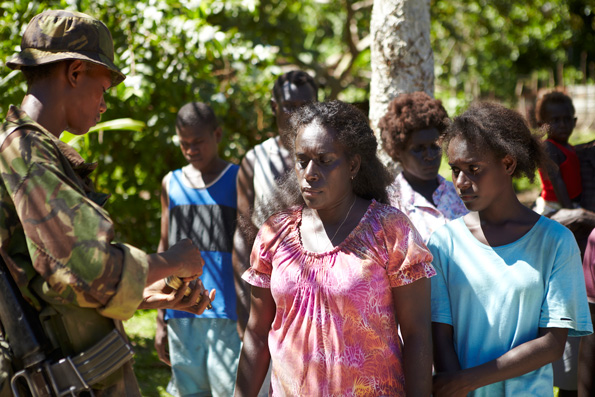
Sometimes… we would set a building on fire and just run the cameras – we shot digitally so we could just keep the cameras running. In some cases, because the drama got a little intense, I would have to run in and give an actor their lines and say “Just say this!” and then I’d run out. We’d pick up a few takes and carry on. So it was a very different process.
For the Papua New Guineans, it was a very different process anyway because they’d never done it before. There were things I didn’t tell them would happen. They hadn’t all read the script so we’d set up 200 people in the village and not necessarily tell them what was gonna happen so that their reactions would be more real – which is what I do working with children sometimes. You’re always going for spontaneity and really good actors can create it but when you’re working with non-actors you sometimes have to get that spontaneity by surprising them.
WATCH CLIP: “Jaggers”
At what point did Hugh Laurie come on board?
Very early on – his name came up and it was just immediate, surprising and perfect all at the same time. You wouldn’t necessarily think he would play this kind of role but as soon as I mentioned his name in the role, everybody would just be like, “It’s perfect.”
Is it scary when that happens because there’s a risk that you can get fixated on that actor to the detriment of casting someone else?
I wasn’t scared in this case because I’d followed his career since Fry & Laurie and when I saw House I thought he was one of the most versatile actors out there. He was such an advocate from the beginning. Once he’d read the book and we’d met he was behind it 100%. He wrote a really nice letter to the Film Commission, he helped get behind the funding of it, he was a huge advocate.
He was incredibly smart, too. Sometimes he would act as an AD or producer when I needed it. Whenever he saw that I was about to flip out, he’d sort of step in and help out. Even to the point where if I had gotten really sick, I knew he could just direct for a day. Total confidence.

Have you got another book on the brain? Or now does the space come to consider options…
The space comes. I have a development company with Aaron Warner who was my producer on Shrek. We’re always developing projects, either me or somebody else. There’s a few there now that I’ll do at some point but they may not be the next one. I don’t think I know the next one yet. One of those may pop up or it might be something I haven’t even seen yet.
WATCH THE TRAILER
Mr. Pip is in cinemas now – click here for session times and more info


